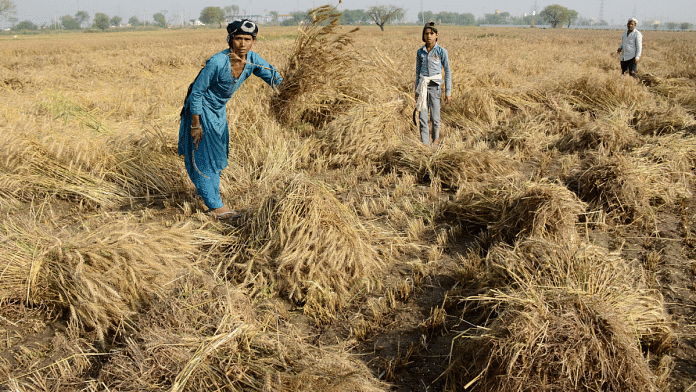New Delhi: Eighty-two per cent of Indians are either “alarmed” or “concerned” about global warming, and favour India’s participation in the Paris Agreement, according to a report from the Yale Program on Climate Change Communication and CVoter International.
The remaining 18 per cent are either “cautious” or “disengaged” about these issues, the report, titled ‘Global Warming’s Four Indias, 2022’ and released Thursday, said.
It identifies four sets of respondents — alarmed, concerned, cautious, disengaged. Among these, those who claimed to be “alarmed” about global warming were most supportive of political and national action to address it and were motivated to take individual action.
To bring out the report, a telephone survey of 4,619 Indians was carried out from October 2021 to January 2022. The questions centred on the Indian public’s climate change awareness, beliefs, policy support and behaviour, as well as perceptions about local weather and climate patterns and vulnerability to extreme weather events.
“Nearly all of the alarmed (94 per cent) say they are worried about global warming, including 79 per cent who are ‘very worried’. A large majority of the concerned (86 per cent) also say they are worried about global warming (17 per cent ‘very worried’),” the report said.
In contrast, fewer of the cautious (41 per cent) said they were worried about global warming, while about half (52 per cent) were not worried, it said. “Only 20 per cent of the disengaged say they are worried about global warming,” it added.
Also Read: Equitable climate action needed to secure future, says IPCC in latest report
Findings of the survey
The majority of the respondents favoured a national programme to teach Indians about global warming and train people for renewable energy jobs, the report said.
As many as 91 per cent of the “alarmed” respondents, 88 per cent of the “concerned”, and 74 per cent of the “cautious”, favoured policy to include a national programme to teach Indians about global warming. A total of 90 per cent, 88 per cent and 75 per cent of the respective segments favoured training people for renewable energy jobs, it added.
“Majorities in all four segments have noticed changes in local weather patterns, including rainfall,” said Jagadish Thaker, project co-lead at the University of Queensland. “The report also illustrates how social and economic inequalities increase climate vulnerability among diverse Indian populations.”
Demography, and social and household characteristics play a vital role in awareness about the impacts of global warming, the report said, adding that the “alarmed” and “concerned” segments are highly educated and younger than the rest of the categories.
The alarmed are “more likely than the concerned and cautious to live in urban areas”, it said. “The alarmed (47 per cent), like the concerned, are more likely than the other two segments to have voted for the BJP/NDA,” the report added.
Among other findings, 74 per cent of the alarmed, 64 per cent of the concerned, and 50 per cent of the cautious felt that the Indian government should be doing more to address global warming
Similarly, 82 per cent of the alarmed, 77 per cent of the concerned and 66 per cent of the cautious favoured India’s participation in the Paris Agreement.
Adopted at the UN Climate Change Conference in December 2015, the Paris Agreement entered into force on 4 November 2016. Its significance is that for the first time a binding agreement brings all nations together to combat climate change.
In 2021, PM Narendra Modi had announced that India will achieve net-zero emissions by 2070. Other commitments include, increasing non-fossil energy capacity to 500 GW, fulfilling 50 per cent of energy requirements from renewable sources, reducing carbon intensity of economy by 45 per cent, and reducing total projected carbon emissions by 1 billion tonnes.
“The implications of this report for India are significant, as it shows that the majority of the Indian public is concerned about global warming and supports climate and energy policies,” said Anjal Prakash, Associate Professor (Research) and Research Director at the Bharti Institute of Public Policy at ISB, who was not involved in the study.
“The report highlights the need for targeted communication strategies. Additionally, the report illustrates how social and economic inequalities increase climate vulnerability among diverse Indian populations.”
These findings, he added, should encourage policymakers and businesses to take immediate action to address global warming and work towards developing sustainable solutions that benefit all segments of society.
(Edited by Tony Rai)
Also Read: ‘60% chance’ of El Nino onset in May-July, but may not lead to bad monsoon in India, says IMD



